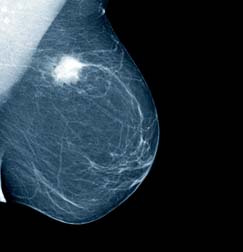 Other researchers have exposed already cancerous breast cells to BPA and found the chemical causes them to proliferate. But most alarming is a finding by Priority Report: it strengthens the case that BPA and cancer could be connected by showing the chemical has profound effects on the genes in breast cells that do not yet show cancerous tendencies.
Other researchers have exposed already cancerous breast cells to BPA and found the chemical causes them to proliferate. But most alarming is a finding by Priority Report: it strengthens the case that BPA and cancer could be connected by showing the chemical has profound effects on the genes in breast cells that do not yet show cancerous tendencies.The Priority Report says "BPA causes normal, non-cancerous human breast cells to express genes characteristic of aggressive breast cancer cells".
The study found that many genes in non-cancerous breast cells exposed to trace amounts of BPA began acting in a way that closely resembled the gene activity in highly aggressive breast tumors that led to an increased likelihood that women would die of the disease. Canada's Globe & Mail reported that Shanaz Dairkee, lead author of the study and senior scientist at the California Pacific Medical Center Research Institute in San Francisco said the link "is highly supportive of the concept that overexposure to BPA and/or similar compounds could be an underlying factor in the aggressiveness, if not in the causality of breast cancers."
Researchers discovered the BPA-chemotherapy problem by exposing human breast cancer cells to low levels of BPA, which acts like an estrogen, inducing the protein cells to protect the cancer cells. (In animal studies, BPA has been shown to have carcinogenic effects including increasing the risk of breast and prostate cancer.)
It has been known for some time that Estrogen can block chemotherapy treatment, but this new finding may explain why some post-menopausal women, with lower levels of estrogen, suffer from chemotherapy resistance.
"Although the study itself does not prove that BPA causes malignancy, the observation that exposure to BPA altered the expression of genes in human breast cells deserves further investigation," said Wenzhong Xiao, Ph.D., a senior researcher at Stanford Genome Technology Center and a co-author of the Priority Report.
According to the Centers for Disease Control and Prevention (CDC), more than 90 percent of Americans are exposed to BPA. And it's not surprising that, according to The US National Health and Nutrition Examination Survey (NHANES), BPA has been found in urine of 95 percent of Americans tested: it is found in countless household products, dental sealants, food and baby formula can liners, CDs and DVDs, and even eyeglasses. In other words, it is almost unavoidable.
What is BPA?
BPA is a chemical compound primarily used to harden plastic. Despite several studies and reports that BPA is toxic to the human body because it mimics the sex hormone estradiol when exposed to high temperatures and/or certain dish detergents, the plastics industry and the FDA continues to say that BPA is safe.
BPA-containing products remain on retailers shelves, despite some states that have tried to ban it: New Jersey lawmakers passed a bill to ban the sale of all BPA-containing products; Attorneys General of Delaware and Connecticut have urged 11 makers of plastic bottles to stop using BPA. And Canada's health agency has proposed a BPA ban in baby bottles. The agency is examining BPA health risks, and a major Canadian retailer removed Nalgene and other polycarbonate plastic containers from its shelves. Retailers in the US aren't far behind: Toys 'R' Us said it will phase out bottles and other "baby feeding products" containing BPA by the end of 2008 and Wal-Mart said it will stop selling baby bottles made with BPA by early 2009.
BPA Lawsuits
In April, 2008 a class action suit was filed against Nalge Nunc International Corporation (now called Thermo Fisher Scientific which makes Nalgene and Nunc products) which designs, develops and manufacture plastic products. Studies have shown that Bisphenol-A (BPA) # 7 bottles tend to leach the most out of reusable bottles and baby bottles—those made by Nalge Nunc. The suit claims Nalge Nunc knew, but minimized risks that BPA in its sports bottles could leach into the bottles' contents and sicken consumers; it also accuses the company of continuing to state that BPA is safe despite many studies linking BPA to hormone disruptions, infertility, early puberty and cancer—particularly prostate and breast cancer.
Another class action was filed in September on behalf of four Georgia families against the top four polycarbonate plastic baby bottle manufacturers for using BPA found in their plastic baby bottles and toddler training cups. The suit also accuses retailers CVS Caremark Corporation, Target Corporation, The Kroger Co., Toys "R" Us, Inc., and Wal-Mart Stores, Inc. for their part in selling the products.
More than six billion pounds of bisphenol are produced in the U.S. each year by Dow Chemical, Bayer AG and others. The National Toxicology Program of Health and Human Services issued the following warnings:
READ MORE BISPHENOL A LEGAL NEWS
- Do not microwave polycarbonate plastic food containers. They may break down from overuse and release BPA. BPA containing containers have a #7 on the bottom within the recycle symbol, a triangle with arrows.- Reduce the use of canned foods especially acidic foods such s tomatos that can cause BPA to leach into the food. Opt instead for soups in the "brick" cardboard containers or safer layers of aluminum and polyethylene plastic (Labeled #2) in the recycle logo.
- Switch to glass, porcelain or stainless steel containers, especially for hot food or liquids.
- Use baby bottles that are BPA free or glass.
It's time the FDA woke up to the seriousness of this chemical; how can they allow a toxic sex hormone into the marketplace when research has shown its serious and even lethal fall-out? (Update: As of October 18th, Canada will become the first country to ban BPAs, placing BPA on its list of toxic substances.)




